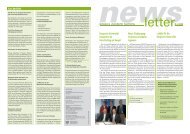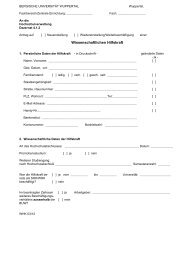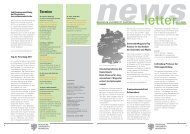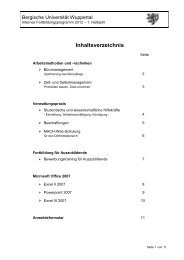international - Bergische Universität Wuppertal
international - Bergische Universität Wuppertal
international - Bergische Universität Wuppertal
You also want an ePaper? Increase the reach of your titles
YUMPU automatically turns print PDFs into web optimized ePapers that Google loves.
100<br />
bathroom or kitchen. My col-<br />
league Guo laughed when I<br />
asked him whether students<br />
could do their own cooking.<br />
He said they were all away<br />
from home for the first time<br />
and it would be far too dangerous<br />
to let them loose in a kitchen.<br />
Showers are available<br />
in another building, and there<br />
is also a common washroom<br />
on every floor. Men’s and<br />
women’s dormitories (halls)<br />
are strictly separated and<br />
visiting is not allowed. But<br />
don’t let that put you off going<br />
to China – <strong>international</strong><br />
exchange students are often<br />
given more comfortable living<br />
quarters.<br />
China is simply different. The<br />
culture, the people and the<br />
language can’t be compared<br />
with those in the west. Language,<br />
of course, is the key<br />
to a culture; but the idea of<br />
learning sufficient Chinese<br />
for daily use in the space of<br />
a few weeks is rather utopian.<br />
Not that it’s all that difficult<br />
to construct sentences<br />
in Chinese, but learning the<br />
four different pitched tones<br />
plus the neutral tone through<br />
which a word can take on five<br />
different meanings is another<br />
matter. People for the most<br />
part don’t understand you on<br />
the street, even if you think<br />
you’ve constructed a perfect<br />
Chinese sentence, but that’s<br />
not generally a problem. You<br />
always manage in the end to<br />
get something to eat or buy<br />
what you want. often some<br />
friendly person with a bit of<br />
English will help, and waiters<br />
in restaurants don’t mind<br />
spending longer with you<br />
when you’re ordering a meal.<br />
Passers-by on the street quite<br />
often take out their mobiles<br />
for an ‘unobtrusive’ snapshot,<br />
while you’re waiting for some-<br />
one. It’s just not possible as<br />
a European to remain unnoticed,<br />
especially in a place like<br />
Kaifeng, where foreigners<br />
of any sort are rare. So how<br />
should one behave as a foreigner<br />
living and working for a<br />
few months in China? Integration<br />
is what everyone talks<br />
about, but it really isn’t that<br />
simple when you don’t speak<br />
the language well. Nevertheless,<br />
it can work, so long<br />
as you are courageous and<br />
open about it. You just have<br />
to find people who share<br />
that attitude. I took the step<br />
of enrolling at the only fitness<br />
studio in the town, where I<br />
do aerobics with thirty Chinese<br />
housewives once a week.<br />
That’s pretty hilarious, but<br />
also hard work. our trainer is<br />
merciless. Integration is hard<br />
work for both sides.<br />
People rarely smile when you<br />
make eye contact; it’s just<br />
not part of their culture. But if<br />
you smile at them in a friendly<br />
way, they often greet you in<br />
return, especially if you are a<br />
foreigner. Whether in stores<br />
or at street vendors and kitchens<br />
the tone is fairly rough.<br />
There are simply too many<br />
people; everyone is just part<br />
of the great whole, so no<br />
one cares what others on the<br />
street think of them. You often<br />
see people walking in pajamas<br />
in the evening, sometimes<br />
even during the day,<br />
and every Chinese person<br />
seems to possess a pair of<br />
fluffy slippers. They do a lot of<br />
sports and fitness exercises<br />
together in public spaces –<br />
especially elderly people can<br />
be seen doing yoga or relaxation<br />
training in parks. The<br />
general atmosphere is a bit<br />
like on a campsite, with people<br />
sitting on small folding<br />
stools or strolling across the<br />
street for a shower with toilet<br />
bag in hand. Many Chinese<br />
apartments have no shower<br />
of their own, so people have<br />
to use public facilities.<br />
Transport for most people is<br />
by bicycle (sometimes electric)<br />
or scooter. There are also<br />
hordes of taxis and tuk-tuks<br />
on the streets. Very few Chinese,<br />
even today, can afford<br />
their own car. So the bicycle<br />
and scooter are used to take<br />
whatever is necessary from<br />
A to B – sometimes impressive<br />
loads, including dogs,<br />
babies and old people. There<br />
are traffic rules, but nobody<br />
seems to take much notice of<br />
them. Whether you drive on<br />
the right or left depends on<br />
which side is busier. But despite<br />
the chaos I have rarely<br />
seen an accident – not least<br />
due to the fact that the horn<br />
is used continuously as a warning<br />
signal: “Watch out, I’m<br />
coming!”<br />
So what can I say now in the<br />
end? I’ve had a great time in<br />
China – a time I would not<br />
want to miss and that I’ll<br />
never forget. Every day in a<br />
101

















